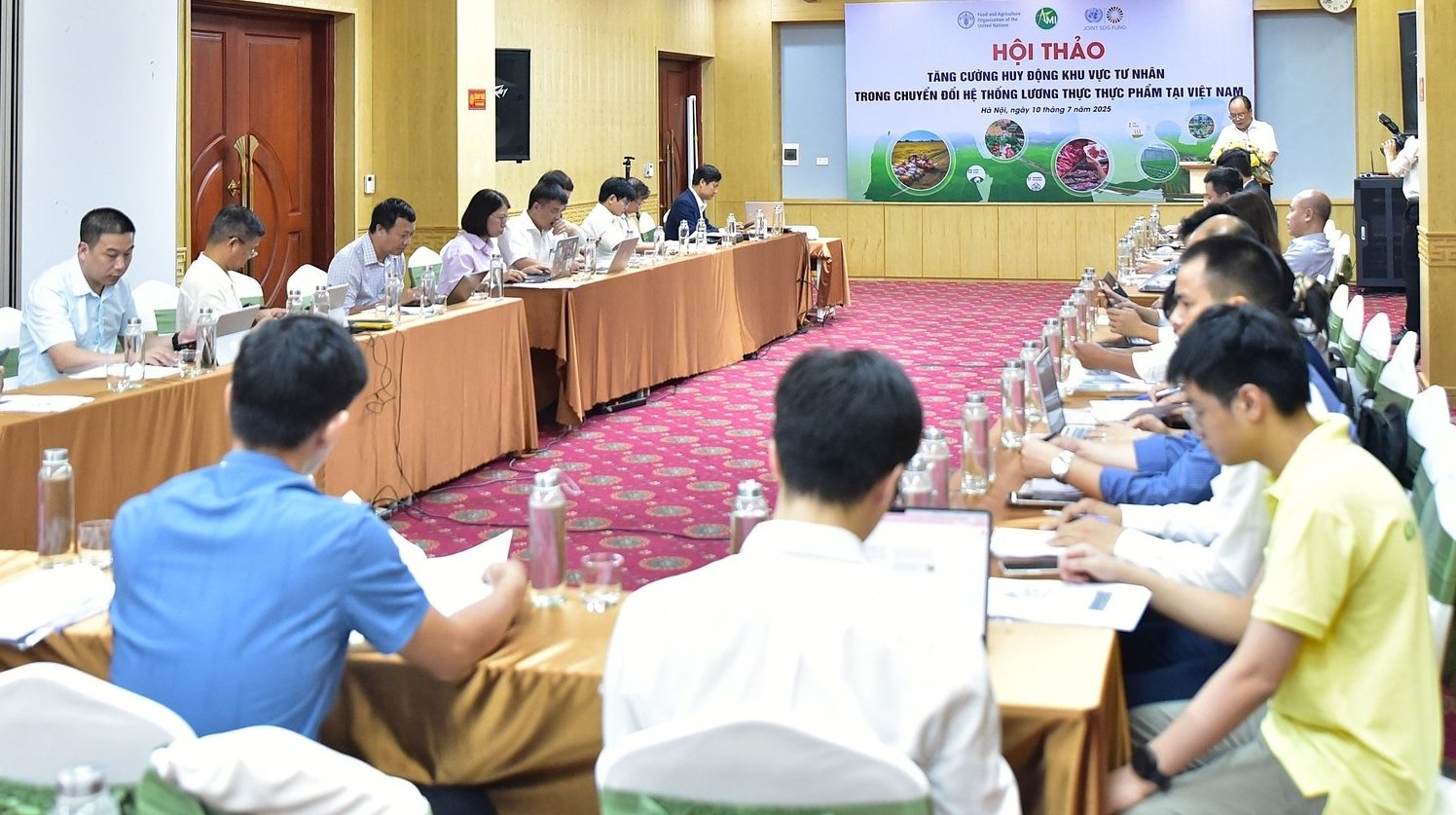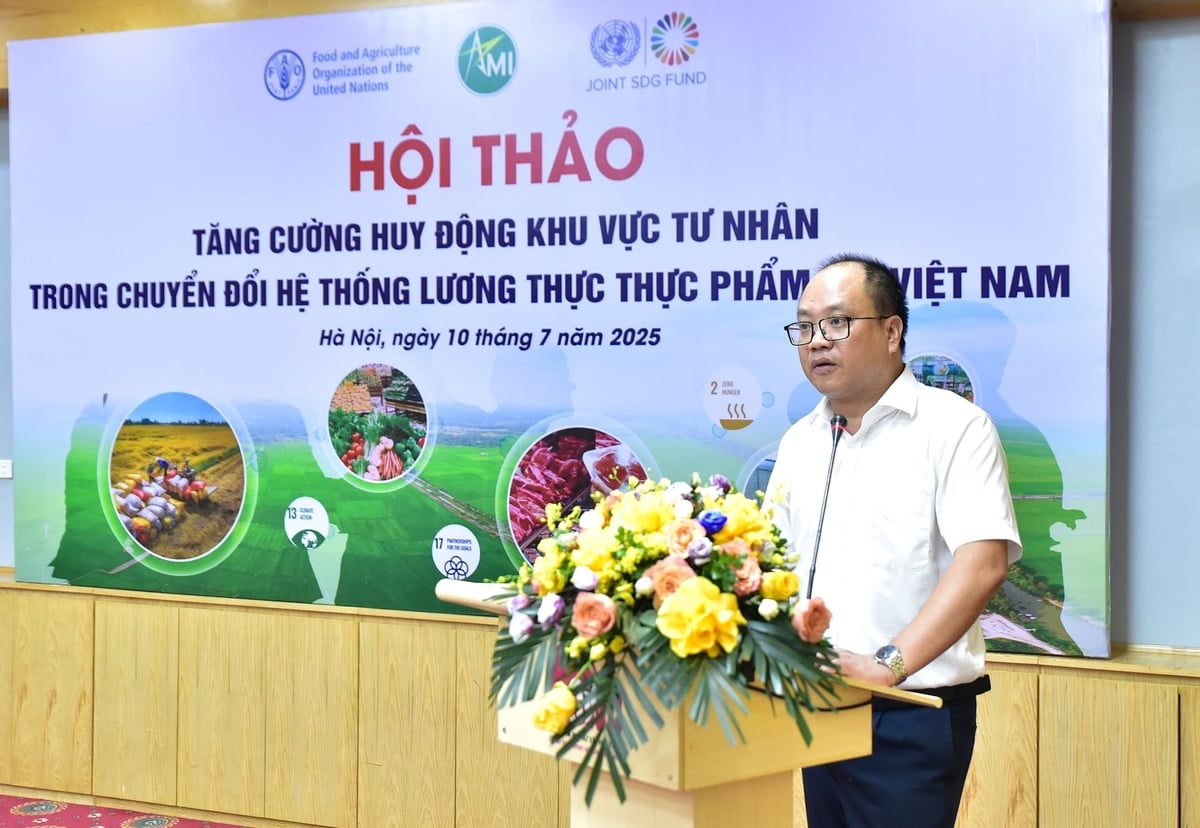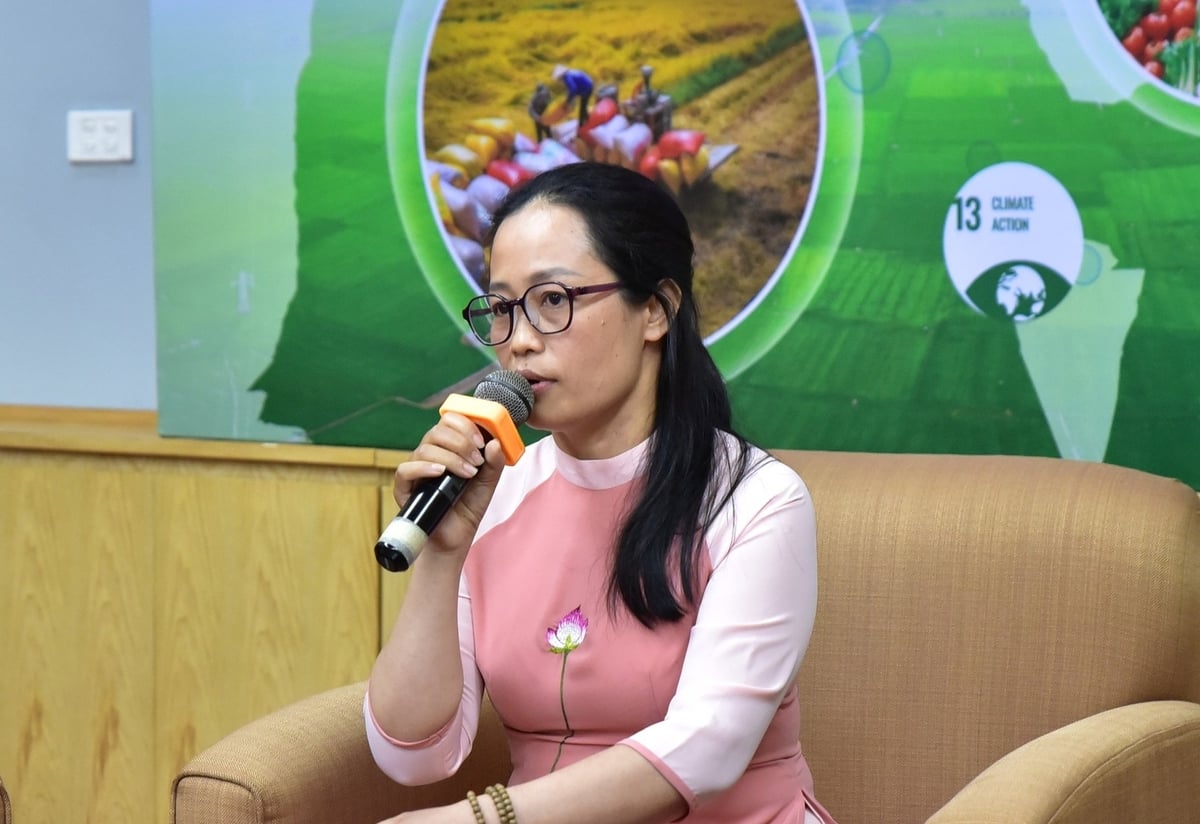December 7, 2025 | 20:37 GMT +7
December 7, 2025 | 20:37 GMT +7
Hotline: 0913.378.918
December 7, 2025 | 20:37 GMT +7
Hotline: 0913.378.918
On July 10, the Food and Agriculture Organization of the United Nations (FAO) in Viet Nam, in collaboration with the Institute of Agricultural Market and Institution Research (AMI), organized a workshop on "Enhancing private sector engagement in agrifood systems transformation in Vietnam."
The workshop was held within the framework of the project titled "Incubation of innovations in partnerships and financing for agrifood systems transformation in Viet Nam." The project is funded by the Joint SDG Fund through FAO, the United Nations Development Programme (UNDP), and the International Fund for Agricultural Development (IFAD).

The workshop aimed at enhancing private sector engagement in the food system transformation toward transparency, responsibility, and sustainability, organized by FAO. Photo: Kieu Chi.
In his opening remarks, Mr. Ngo Sy Dat, Director of the AMI, stated: "In practice, private sector engagement remains limited due to various barriers ranging from lack of information and transparency to difficulties in accessing finance and policy support. Therefore, today's workshop is being held to raise awareness and share the Government's major policies and strategic directions related to food system transformation, as well as to discuss international experiences that could be applicable to Viet Nam."
More importantly, participants also reviewed and proposed mechanisms and cooperation models to foster stronger and more effective private sector participation.

Mr. Ngo Sy Dat, Director of the AMI, spoke at the conference. Photo: Kieu Chi.
According to Dr. Dang Kim Son, senior expert and Head of the expert group for developing Viet Nam’s National Action Plan on Food System Transformation, Resolution No. 68-NQ/TW on the development of the private economy aims to remove existing barriers and create breakthroughs for private enterprises. Accordingly, the role of the private sector in the food systems transformation process is becoming increasingly essential and indispensable.
"Viet Nam will strengthen the linkages between the economy, nutrition, and the environment not only to ensure national food and nutrition security, but also to prevent natural disasters and protect the environment, building upon existing advantages," Dr. Son further shared regarding the objectives of Decision No. 300/QD-TTg dated March 28, 2023, by the Prime Minister, which approves the National Action Plan for a transparent, accountable, and sustainable food systems transformation in Viet Nam by 2030.
Mrs. Nguyen Thi Mai, Director of Vinh Ha Food Joint Stock Company, noted that small enterprises are currently facing barriers due to a lack of market information, especially regarding large export markets such as Europe, Japan, and the United States. Due to the absence of official channels, many businesses have not been able to establish sustainable raw material zones for processing.
Additionally, the private sector continues to face difficulties in accessing financial resources from international funds and navigating guidance documents for implementing existing policies. These challenges hinder their ability to invest in innovation, build resilient supply chains, and scale up sustainable production practices.

According to Mrs. Nguyen Thi Mai, Director of Vinh Ha Food Joint Stock Company: the small production scale of both cooperatives and individual farmers poses significant challenges to market expansion and sustainable development. Photo: Kieu Chi.
Local communities' access to information and connectivity also remains limited. Geographic conditions and the capacity for linkages between cooperatives and individual farmers, as well as among cooperatives themselves, still face significant challenges.
During the workshop's discussion session, local participants identified key bottlenecks hindering private sector participation in transforming Viet Nam's food systems: unstable policies, fragmented and small-scale production, high risks associated with sustainable agriculture, an aging rural labor force, and limited access to capital.
Therefore, strengthening cooperatives' capacity in financial management, business operations, e-commerce, and digital transformation is essential. The goal is not merely to become production hubs but to build sufficient capacity for integration, market participation, and access to financial resources.
Participants also proposed risk assessment, management, and communication as crucial strategies to enable the private sector to accelerate and engage more deeply in market supply chains.
The workshop concluded with a consensus that overcoming these barriers requires a comprehensive approach, particularly the development of a long-term national strategy, the establishment of effective multi-stakeholder governance mechanisms, and the promotion of innovative financial instruments such as green funds, preferential credit schemes, more flexible public-private partnership (PPP) models to attract stronger private investment in Viet Nam.
Translated by Kieu Chi

(VAN) At the TARASA25 Conference, participating countries shared experiences on implementing agroecology and regenerative agriculture, contributing to a sustainable transformation of food and agriculture systems.

(VAN) Green industry is becoming a driving force for the development of Hue City, not only promoting economic growth but also protecting the environment, creating the foundation for the Net Zero goal.

(VAN) As of 2025, the ASEAN region has a total of 69 ASEAN Heritage Parks recognized across its 10 member states. Among them, Viet Nam contributes 15 ASEAN Heritage Parks.

(VAN) Yok Don National Park has high biodiversity with numerous endemic plant and animal species, and it is also the only dipterocarp forest ecosystem conservation area in Viet Nam.

(VAN) Viet Nam and Brunei signed two important MOUs on fisheries and IUU, expanding cooperation in agriculture, the environment, and Halal exports, aiming to substantively implement joint projects.

(VAN) The Viet Nam Coconut Association worked with the International Finance Corporation (IFC) and businesses to promote the supply chain, enhance competitiveness, and develop the coconut industry sustainably.
![Hue aims for Net Zero: [2] Pioneering low-emission tourism](https://t.ex-cdn.com/nongnghiepmoitruong.vn/608w/files/huytd/2025/12/04/0633-dulichzero-4-095634_236-161125.jpg)
(VAN) The ancient capital of Hue has developed Net Zero tourism products and models, aiming to reduce carbon emissions and pioneer the establishment of Viet Nam's green tourism destination.